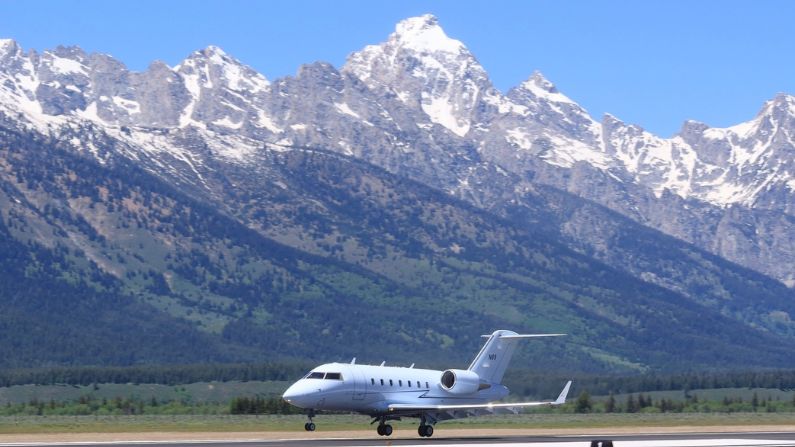Jackson, a town known for tourism and off-season travel, has been without any public transportation to the airport for years.
“At least in my nine years in Jackson, it’s been an ongoing question about how to get transit started at the airport,” Jim Elwood, the Jackson Hole Airport’s executive director, said.
But, that’s about to change — albeit temporarily.
On Monday, elected officials approved a pilot airport shuttle, which will run through the winter season. This comes after both the START and airport boards greenlighted the program.
START Director Bruce Abel told elected officials that the goal is to start small and use the program as a jumping-off point.
“We really are looking at this as a learning lesson to see what changes may need to be made in order to make this a long-term, sustainable project,” Abel explained.
The 53-seat, low-cost bus will pick up riders at various spots around downtown, including Miller Park, the Antler Inn, and the Deloney and Home Ranch parking lots. It’ll run hourly from 5 a.m. to 10 p.m.
Uncertain funding
The sticking point remains long-term funding.
The pilot will be funded by the Jackson Hole Airport, which the Federal Aviation Administration (FAA) approved. The FAA has okayed the start-up money but doesn’t want those funds to be used for the off-site shuttle long term.
Elwood told the elected officials that this is the first time — that he knows of — that the FAA has allowed an airport in the U.S. to use these funds for transit.
“The continuing funding — they have severe reservations,” Elwood said. “The fact they were able and willing to give us special consideration in this case, we should consider to be just terrific news.”
While it’s still unclear where future funding will come from, Abel suggested potential sources could be the town and county, or the Jackson Hole Travel and Tourism Board. Or the FAA could continue approving the airport funding the system.
But electeds, such as councilmember Jim Rooks, still were worried about what may happen down the line.
“We wouldn’t want to be in a situation where we offer up an airport shuttle and then it goes away again due to lack of funding,” Rooks said.
Jackson has had a low-cost airport shuttle before, but it shut down largely because it wasn’t financially viable.
According to a staff report, about $50,000 in revenue is expected to come from fares for the four-month pilot.
Riders above age 12 will have to pay $10 a trip. That’s about $30 cheaper than the typical Uber fare between town and the airport.
But, according to Abel, ride-share programs like Uber and taxis will still have a place in town.
“If someone is traveling with a family of five and skis, it may well be more cost-effective for them to use a taxi to go from the airport directly to their lodge,” Abel said.
He continued, “A couple traveling — it may well be more appropriate for them to be dropped off by a neighbor at one of the four drop-off points and head out to the airport.”
‘Cracking the nut’
Still, some leaders, including Teton County Commissioner Greg Epstein, had concerns that the pilot is “too small” — with no stops in Teton Village, where many winter travelers stay.
“I don’t know if we are going far enough to make it a successful pilot,” Epstein said.
Others worried that the shuttle won’t be reliable enough for people to use, with no online system to book ahead of time. They said there may not be enough seats on the bus for early morning flights, for instance.
But Abel didn’t seem to think this would be an issue. He assured officials there will be some “self-monitoring” with some people going to the airport hours before their flight and others cutting it closer to boarding time.
Margie Lynch, who leads the local Jackson Hole Climate Action Collective, told the officials it’s essential to “crack this nut” since an estimated 60% of greenhouse gas emissions in the region come from ground transportation.
“It is important that this effort be reliable so that people know it’s out there,” Lynch said. “Hopefully, we’ll be back in a year approving a more significant effort.”
The pilot is slated to run from mid-December to mid-April. Abel said there’s likely to be some hiatus between the end of the shuttle and the start of the new program, where transportation officials can evaluate the success of the program and figure out how best to have a shuttle long term.
“If it fails, we know. If it’s successful, we’ll know. If it’s sort of mediocre, that’ll be a challenge,” Abel said. “[But] the long-term funding solution is the issue that we need to craft.”
**Correction: An earlier article said the funds for the pilot are coming through the Federal Aviation Administration. This is incorrect. The money is coming from the Jackson Hole Airport, which the FAA had to approve.






